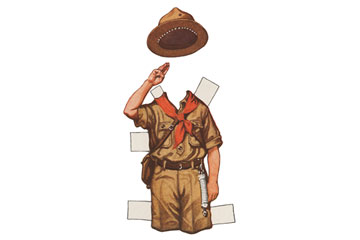
You would not think I have the kind of skills that lead people to ask me for help. I can't raise a barn, revive a passenger or stay awake while people talk about their feelings. Yet several times a week, I tell my lovely wife Cassandra I'm busy "helping the children," which sounds far better than "giving antiquated career advice to kids who just graduated from elite colleges and are going to be rich anyway."
But it turns out, according to Adam Grant's book Give and Take: A Revolutionary Approach to Success, that I have not only been contributing to society but also motivating myself. Grant--who got his Ph.D. in less than three years, consults for Google and, at 31, is the youngest tenured professor at the Wharton School--helps everyone who asks him. He fields 100 requests a day, answering e-mail--much of it from people he doesn't know--for three hours every night after he puts his daughter to bed. Cassandra couldn't believe how similar we seemed. "He's pissing his life away. I bet his wife and children hate him. People of the world will love him, but he will be divorced," she said. "You're both compulsive people pleasers." I tried very hard to convince Cassandra that I wasn't a people pleaser, until I realized I was proving her point. So I stopped talking and gave her a massage.
However, I was so enticed by Grant's research that I decided to enlist him to help me increase my giving. After e-mailing Grant, I instantly got a form reply saying he might not respond, since his top priorities are "family, students, and colleagues." Four minutes later, however, I got this e-mail: "That sounds like an enthralling column--I'm honored. Sign me up!" followed by a list of videos and articles I might find helpful.
Grant advised me to get right to it. Fortunately, a volunteer for Howard Dean whom I met when reporting on the 2004 elections but don't remember sent me a message on LinkedIn, which I don't remember joining. She asked me to get her boyfriend an interview at TIME. So I put him in touch with an editor. Then I drove 30 minutes each way to appear in a documentary about the Ultimate Fighting Championship. I also wrote a really positive blurb for a self-published book that I didn't think was great. Then I waited for the rush of altruistic superiority. But it never arrived. That might be because I had landed an interview for a guy who could suck, pretended to be an expert on a violent sport I've never seen and misled book buyers. I was just lucky that the Egyptian army didn't e-mail me for advice on cracking down on protesters.
When I told Grant that I got nothing out of the experience, he told me that I had indeed confused helping people with pleasing them. So for my second day, I read a friend's play about a performance artist and gave harsh rewrite suggestions, though I left out "Don't write a play about a performance artist." I met with a woman who wanted to become a sitcom writer and told her to write some specs but that getting hired as a beginner in her 40s was going to be tough. I read the hundreds of pages of e-mails a friend of an old TIME writer had sent me about her young husband's death from cancer and put her in touch with my agent, though I told her that the odds of her manuscript's being published were very low. I felt less like a helper than a dick.
